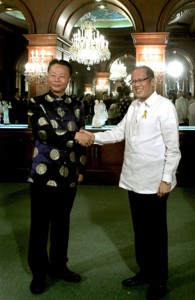After his “very cordial” 15-minute meeting with Chinese Ambassador Zhao Jianhua in Malacañang on Tuesday, President Benigno Aquino 3rd is hopeful that the relationship between Manila and Beijing will “move forward” amid disputes in the West Philippine Sea (South China Sea).
The new Chinese envoy presented his credentials to the President and the two officials agreed that the maritime row between the two countries is just a “small part” of a bigger and “multifaceted” relationship, according to Palace deputy spokesperson Abigail Valte.
She said the meeting between Aquino and Zhao lessened tensions at Ayungin (Second Thomas) Shoal and Panatag (Scarborough) Shoal, two of a number of islets that are being claimed by the Philippines and China.
“We’re hoping that [the relationship] will continue to move forward, which the President also expressed this morning,” Valte added.
Despite the sea dispute, the Palace official maintained that there are other areas where the Philippines and China can move together as good neighbors such as in trade, tourism and transnational crimes.
When asked if Zhao’s visit to the Palace indicated that the ties between the two countries are improving, Valte replied, “Even with the previous [ambassador], it has always been like that. We’ve always agreed that the relationship with the People’s Republic of China has always been multifaceted, and that the dispute in the West Philippine Sea is just a part or a segment of that relationship, and we see no reason why other segments of that relationship cannot move forward because of that one.”
Valte was referring to former Chinese Ambassador Ma Keqing, Zhao’s predecessor.
Not the first
On Tuesday, China’s defense minister said Beijing will not act first to “stir up troubles” over island disputes with its neighbors.
He issued the statement at a meeting with American counterpart Chuck Hagel that was overshadowed by regional tensions.
China and Japan are also embroiled in a bitter row over disputed islands controlled by Tokyo in the East China Sea, raising concerns about the possibility of a clash between the Asian powers.
“We will not take the initiative to stir up troubles,” Gen. Chang Wanquan told a joint news conference in the Chinese capital.
The ministers’ meeting came a day after officers allowed the US Defense Secretary to tour the country’s first aircraft carrier, a rare move by the normally secretive People’s Liberation Army (PLA).
But despite lip service on dialogue and cooperation surrounding Hagel’s trip, which follows a visit to Japan, the news conference highlighted numerous disagreements between the two countries.
Beijing was ready to resolve disputes peacefully, Chang said, but added that “China has indisputable sovereignty” over the islands involved, calling territorial sovereignty a “core issue” on which “we will make no compromise.”
China-Japan relations were in “severe difficulties,” he said, expressing hope that Washington could restrain Tokyo and “not be permissive.”
In November, Beijing unilaterally declared an air defense identification zone (ADIZ) over the East China Sea, including the disputed islands, prompting US condemnation.
Beijing requires aircraft flying through it to identify themselves and maintain communication with Chinese authorities.
Wagging his finger, Hagel said setting up ADIZs without consulting other governments was risky as it could lead to “misunderstandings” and “eventually get to a dangerous conflict.”
He reiterated that the US takes no position on territorial issues, wanting the disagreements resolved “peacefully.”
But Hagel said the “Philippines and Japan are longtime allies of the United States.”
Washington had treaties with both countries and “we are fully committed to those treaty obligations,” he said.


